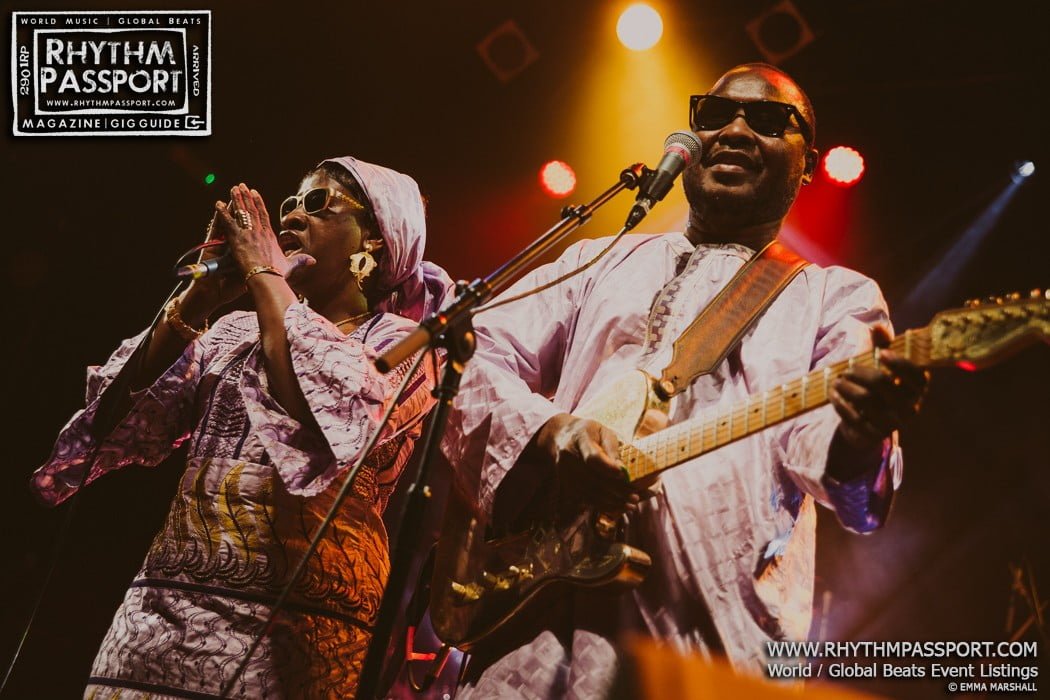Chaos and confusion seem to dominate our lives at the moment, but one thing you can depend on is a steady stream of new music from one of Mali’s most famous couples, Amadou & Mariam.
On the eve of the UK leg (on the 4th of November at Troxy) of their tour to promote the latest album La Confusion, Amadou spared a few minutes to talk to Rhythm Passport about their lives and music.
We’re very excited to let our readers know a little more about you, so tell us about your new album, its style, and why you gave it that title?
“First of all, we are very happy with how La Confusion turned out. It has elements of rock, traditional African music, afrobeat, blues and electro. We gave it this title because it’s a complex time in the world at the moment. There is always confusion everywhere. In our songs, there are many metaphors regarding this situation, but men and women must continue to talk about what is going on.
We both write the lyrics, sometimes Mariam and sometimes me (Amadou), and these are the words that speak about the situation of the world, work, immigration, African history and culture”.
The album has an accessible ‘pop’ sound to it. Who produced this one?
“The record label offered the French producer Adrien Durand the chance to work with us, it was him who gave it its special sound”.
Now, you are exceptionally well known throughout the world. Was there one pivotal moment that made your careers – one particular hit song, perhaps, that made your duo famous?
“I could say many things, but ‘I Think of You’ [a single that came out in France on Polydor, 1998] is very popular everywhere. But there is also ‘La Réalité’ from Dimanche à Bamako and ‘Sabali’ [from Welcome to Mali, 2008]”.
Yes, one album that really brought you to the attention of audiences here in the UK was ‘Dimanche à Bamako’ (produced by Manu Chao in 2005) – so many catchy tunes! ‘Bofou Safou’ from your new album seems like it will also be one of those tracks that ends up on repeat. Do you have a secret recipe for writing hits?
“I hope also that the people will dance with ‘Bofou Safou’! But really there is no secret. It is the connection with the public – the ability to make a song that touches all sides of humanity. For the mix of our sound, it’s basically entertaining music, songs that speak to people of the everyday things in life. I think that’s why we are so popular – especially in West Africa”.
You’ve played for football anthems and opening ceremonies, for charities and alongside some of the world’s biggest stars like David Byrne, U2, Blur and the Scissor Sisters at huge arenas like the O2. You’ve even played on the main stage at Glastonbury in 2008.
“Yes the list is enormous, and we can say that we have been very privileged by all the collaborations that we’ve done up to this moment. It’s always interesting to work with other artists because it’s another way to be influenced and have different musical experiences”.
If this is not too personal a question, is it sometimes difficult being a couple and working together on projects?
“No, we have a good rapport and it works just at the moment – I hope that it will continue like that! [laughs] We’re always together and we talk a lot, so we get on very well. There is always good communication between us. Yes, music is our life, and our son is also a singer and guitarist. He makes rap”.
For our readers who don’t know, you are both blind. It seems ironic that your image is such a strong visual part of your identity. You always look great posing together in your sunglasses. Does that feel strange to you?
“No, it’s normal. We’ve always been like that. Also, our clothes are made in Africa and it’s just part of our style. Our latest publicity shots were done by Hassan Hajjaj”.
Ah yes – London-based Moroccan artist Hassan Hajjaj has worked a lot with world music artists in his photographs (his exhibition La Caravane is on at Somerset House from 5th October until 7th Jan 2018).
“Yes, he’s good to work with – the photo shoot was well spent – a very easy and fun session! ”
Also, you taught music to the blind children at the institute that you yourselves attended when you were young. It must be great for the children there to have such wonderful role models.
“It is always touching to share things, so for us, it is really a joy to talk about our experience with the people and to give something to them that will help in their lives.”
And finally, is there one message you would like to pass on to people?
“Education is important, and you need to have a special sensitivity. It is all about the wealth of the people, culture and history. We listen a lot to the radio and talk on the phone to know how it is in the world. We must share and know well what happens in our villages, our cities, and our countries. Our message to people in Europe, West Africa and all across the world is that we must talk!”


